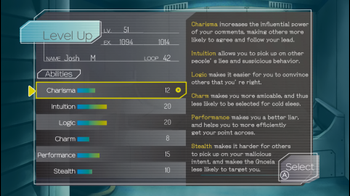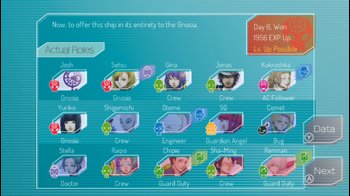
Gnosia Review
Time travel is perhaps one of the most popular touchstones in all of fiction, having already been thoroughly explored throughout books, films, shows, games, and so on. The fascination surrounding the mysteries of time is endless and bountiful. I am often intrigued by all the ways it is tackled and presented, but it can be easy to miss the mark with all the plot intricacies it entails.
Video games, in particular, open up a unique avenue for players to engage with time travel in fun ways. Chrono Trigger stands out for most RPG players as they ventured through beautiful depictions of different time periods with party members coming from each. Link often engages with time travel instruments and mechanics throughout several entries in The Legend of Zelda series. Titanfall 2’s most famous level in its single-player campaign allowed players to manipulate a time travel device to maneuver around a level. I am still quite fond of Radiant Historia due to how it weaves time travel elaborately into its narrative and quest design. There are many, many other games that have incorporated it in clever, creative ways.
Very few games have surprised me in the way Gnosia has, though. It is a time travel game where its primary gameplay loop revolves around the Mafia and Werewolf-style party games (or Among Us, if you prefer) overlaid with RPG stats and skills. If you think that’s bizarre, Gnosia also somehow encapsulates what it must truly feel like to be a time traveler throughout every nook and cranny of it brilliantly. I think this is such a special game that deserves recognition.
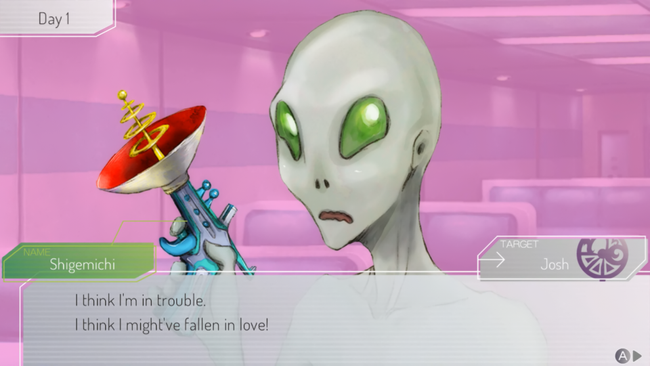
Gnosia has players take on the role of, well, themselves; they start the game creating their own character with a name, sex (the inclusion of a non-binary option is welcome!), and stat allocations. These aren’t your typical strength, dexterity, agility, and luck options. Instead, Gnosia’s “combat” is done verbally with up to fourteen other participants. So in turn, stats come in the form of charisma, intuition, logic, charm, performance, and stealth. The game does a fantastic job providing small descriptions upfront about what each of these stats influence.
After a comically swift text scroll of a jargon-laden rundown of the game’s premise, players open their eyes befuddled before they can make heads-or-tails about their situation. This abrupt setup is clearly intentional as the player-insert character is also as confused as the player is. After a brief chat with Gnosia’s other main character, Setsu, the first loop of this strange game begins among a limited slice of its cast.
Here are the basics. As you may have already surmised, the core goal of Gnosia’s gameplay is to determine who the Humans and who the Gnosia(s) are. On the surface, Gnosia are indistinguishable from Humans, but they have the unique ability to lie. They are a threat to humanity and aim to eliminate enough Humans to the point where their numbers either equal or outnumber the remaining Humans, just like Werewolf or Mafia.
The entire game takes place on some sort of spaceship and discussion periods last for five rounds at that spaceship’s bridge. Early on, players will feel powerless due to a lack of stats and skills - similar to most other RPGs. After five rounds of pointing fingers back and forth on whom the Gnosia may be, everyone votes on one individual they feel should be put into cold sleep. This process is a compromise with the spaceship’s AI, LeVi, who would rather simply self-destruct to ensure no Gnosia make it out alive guaranteed, but the survivors thought of a more… humane method to go about it.
After getting a small taste of how Gnosia is played, the player is given the ability to travel through time to repeat the process all over again, though their stats, learned skills, and even relationships are persistent throughout the entire game.
Gnosia’s first 20-ish loops slowly introduce more characters and modifiers that throw a wrench into its gameplay. These modifiers are a handful of special roles that any character can be pre-assigned with from loop-to-loop. Most of these are carryovers by the Werewolf and Mafia party games it takes inspiration from, such as the engineer, doctor, guardian angel, and guard duty. An engineer can choose to submit a report once per discussion period on whether a crew member they have investigated prior is a Human or Gnosia. A doctor occupies a similar role to the engineer, except they report on whether the crew member that was put into cold sleep prior to the current discussion period was a Human or Gnosia.
Meanwhile, the guardian angel can protect an individual from a Gnosia attack for one night, if they correctly choose that individual is indeed the target on that night. Guard duty outright identifies that up to two specific people are confirmed Humans, verified by one another, because they were on the spaceship prior to when the others arrived on it, along with the enigmatic Gnosia infectees. Other than guard duty, there can only be one engineer, one doctor, and one guardian angel. It gets a tad more complicated though.
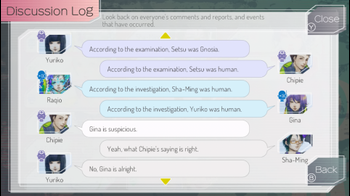
Now remember that Gnosia themselves have the unique ability to lie; those who are on the Human side, normally, cannot lie. There will be instances when two engineers or two doctors (a guardian angel never reveals their identity) step up, signifying that one of them might be the true engineer or doctor and the other is a Gnosia. Although that could be the case, two other roles make this game of social deduction even more tricky - the Anti-Cosmic (AC) Follower and the Bug.
An AC Follower is one Human that supports the cause of the Gnosia and therefore, can lie as well. The Bug doesn’t care which side wins and serves themself. As long as a Bug remains by the end, regardless of whether Humans or Gnosia win, then the Bug automatically wins. The Bug is allowed to lie too. Gnosia cannot eliminate the Bug, but an engineer can, so there can be some nights where two characters are simultaneously eliminated. At its core, the game is largely a logic puzzle; learning, understanding, and mastering the ruleset is critical to its foundation.
Fortunately, not every time loop of Gnosia will have all these additional roles at play. While they do spice up discussions, I believe it was smart of the developers at Petit Depotto to hand over control to the players on how they want to experience it for themselves. Shortly after the “tutorial” period ends in Gnosia, players can configure what the conditions of the next loop are, including how many characters in total, how many Gnosia, and which, if any, of the additional roles they want to play a part in it. They can even choose to be a Gnosia themself or playing a specific role from the get-go.
As players continue to go through loops, certain unique events may occur at any given loop. There’s a brief slot in-between each discussion period where players can choose to level their stats up and visit a character hanging out at some section of the spaceship. Normally, visiting them will be a very brief one- or two-line exchange before someone gets eliminated by the Gnosia.
Special markers have a chance to appear during these parts though. These often result in obtaining a new skill, learning something new about a character to keep note of, or a character’s suspicion that they suspect a specific individual is lying. Of course, that said character could be a Gnosia themself.
Certain events are more likely to appear based on the configuration of a loop. Thankfully, the game eventually unlocks an event search feature that will pre-configure the start of a loop to conditions that will most likely contain an undiscovered event. It is not absolute, though, and there were definitely times I tweaked it just a bit more in my favor to make specific hurdles easier to achieve.
Another aspect to keep in mind is that there is a hidden value for amicability and hatred toward you per character. The more you doubt or accuse a specific person, the more they will tend to dislike you, even in future loops. However, the inverse is also true; covering for them, agreeing with them, and allying with them during loops will have a ripple effect too. As you may have guessed already, these values do play a part in unlocking unique events.
With all that exposition out of the way about this unconventional game, let’s put it together. A normal loop of Gnosia is composed of discussion periods that last for five rounds. In each of these rounds, players will continually doubt someone, cover for others, and may reveal themself to be an engineer, a doctor, or guard duty. Two or more engineers and doctors may occur because a Gnosia, AC Follower, and/or Bug are lying; there can also be scenarios where the true engineer or doctor choose to not step up and the ones that claim that role are all liars because telling the truth may make them a more susceptible target to be eliminated next.
Skills in Gnosia come in the form of debate tactics. Exaggerating the potential risk a person could bring may make more people likely to vote for them. Retaliating harshly against accusations of you may sway some folks to vote for the one who went after you. If you’ve confided with a highly charismatic person in a loop, you may seek an agreement among the rest to trust in what they’re saying. Perhaps you’ll take an engineer’s report on an individual and attempt to convince people to vote for someone you dislike off that report. There are a lot of skills to discover in Gnosia, and they change the dynamic of these discussion periods heavily, especially once characters dish them out more frequently as well.
The skills you learn in Gnosia usually require a stat to be a certain level. Loops tend to reward experience, win or lose, though emerging victorious in harrowing conditions is where the big gains come in. Players can even re-spec their stat allocations under a special condition too.
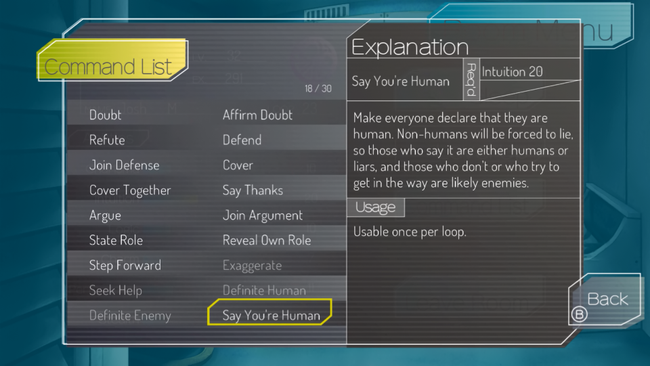
Oddly enough, I certainly felt my character get “stronger” the more I played and leveled up, like a true RPG. As I mentioned earlier, starting out feels disheartening because your character has little-to-no presence in heated debates. Their words fall on deaf ears and they pretty much have to go with the flow to hang on, praying they aren’t the next to go. Gradual stat increases and skill acquisitions eventually make them a verbal force to be reckoned with. I started to gain confidence in standing my ground during discussions slowly, but surely. The character progression feels satisfying as loops went on and on. Eventually, players achieve a level of mastery in an unusual manner; one that the game clearly accounts for in its options menu.
As players become familiar with Gnosia’s roster, they naturally learn their personality quirks and who they tend to dislike consistently. Their stat diagram is listed under their character notes, so players can get a good read on how they will generally behave. Players will be exposed to the same dialogues again and again and again, yet this is intentional by design. Petit Depotto actually put a button mash config option for debates and events, fully aware that they knew that Gnosia’s players would become experienced enough to play through discussion periods instinctively. I just constantly button mashed through later loops, since I already knew how discussions would play out like the back of my hand.
Gnosia does such a tremendous job with sound design in this regard. Each skill has a unique chime ring at the exact moment a character decides to utilize them. I could still keep up with the flow of conversation without even reading anymore because I heard a distinct sound coming from a character pointed to another. There was no need to think twice about it anymore and that is a powerful sensation. Honestly, I was stunned when I came to that realization. It is an excellent small thing that I appreciated so much.
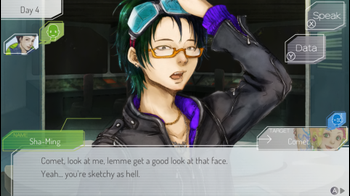
Despite what may seem like an endless sort of game, there is a definitive conclusion to Gnosia; it even has a special true end that can be easily missed too, after all is said and done. Gnosia pretty much tackles and explores any question the player has in the insane universe it dwells in. What exactly are the Gnosia? Why are the time loops occurring? What’s up with that alien-looking dude?
Don’t be fooled by the seemingly restricted format of the game’s structure. There is a lot of world-building that goes on in Gnosia. Each of the characters is more than they appear to be, and the enjoyable part of Gnosia’s gorgeous, distinct look is that it never skimps on stroking the player’s curiosity of its jaw-dropping character designs. They are all designed and behave a certain way purposefully and what you learn about them is often shocking. I cannot stress enough how satisfying it was to witness how the main plot and character moments emerge in Gnosia’s loop-based anatomy. There are often unique CG illustrations to accompany a good chunk of its most impactful scenes, which is a delight because the artwork is downright exceptional. Each character also possesses a handful of distinctive portraits correlating to different expressions too.
Quite frankly, this game might be my favorite time traveler simulator of all time. Players will start to eventually blaze through loops in search of the next narrative thread or character note they need to collect. I confess that Gnosia is a frustrating experience at times, especially toward the last stretch of the game when it requires players to learn every single detail on each character to proceed with the main story. Even when you know what you have to do and play “perfectly”, things may not go your way in a loop by chance. A character will let players know that if they manage to survive till the end of that loop, they’ll tell the player what they need to know - only to be eliminated immediately by the Gnosia.
Yet that frustration is what I fell in love with, because this is what it must truly feel like to be a time traveler repeating a similar set of events over and over and over and over again. The feeling of helplessness, isolation, loneliness, and cynicism as time loops continually to not go the way you want them to. Although some games touch on these themes, Gnosia puts that manual experience at the forefront to players.
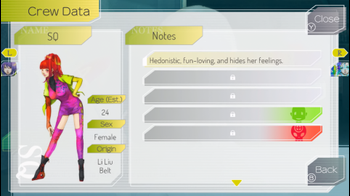
Goals shift the longer Gnosia is played. There are scenarios that are equivalent to RPG boss battles at certain points. Surviving yourself is no longer just enough; you will need to ensure the survival of others to continue forward. On the flip side, players may find themselves up against a highly charismatic Gnosia that they need to put to cold sleep as soon as possible before they, or another key individual, are eliminated - which is Gnosia’s equivalent to an escort mission I suppose.
This melancholic ride is accompanied by a remarkable original soundtrack. There is a slow approach to it that exudes a dreamlike vibe. The most prevalent score that plays during the “free time” slots in-between discussions sounds akin to a lullaby. Its music is simply sublime and adapts to the mood of conversations; one of the most memorable ones for me plays during the aforementioned “boss battle” that absolutely filled me with dread. Since there is no voice acting at all in Gnosia, it is easy to submerge yourself into its wonderful background music.
Gnosia’s English localization is its biggest blemish. There are a handful of stiff lines that slightly dampen the experience. At the time of this review, the in-game manual’s localization contains a handful of typos and factual errors in how the game operates. Playism, luckily, has already addressed the most egregious misstep in its localization on Twitter here and aims to rectify it in short order. Although there are small flaws elsewhere, they weren’t enough to detract me from how much I enjoyed it overall.
The pick-up and play nature of Gnosia works to the Nintendo Switch’s benefit. Each loop roughly takes around 15 minutes at most; obviously, they become much faster once players have a good grasp on what they are doing. Gnosia lasted a solid 15-18 hours for me, which proved to be just enough to not overstay its welcome. I also do not know if I got lucky with meeting the conditions to end the game somewhat early because when I compared notes with a few other friends and colleagues playing, some of them got stuck in this time labyrinth for quite a bit.
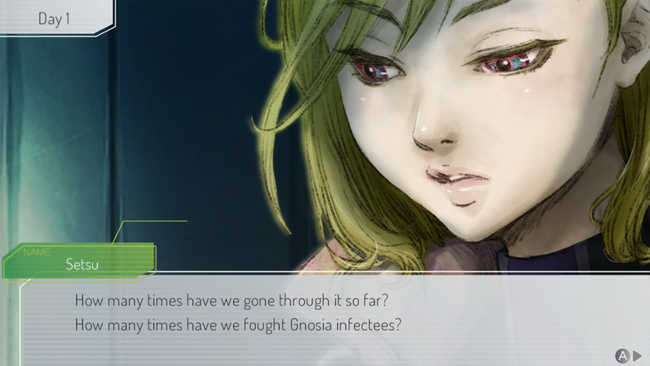
Gnosia is outstanding. Its unconventional structure is definitely not for everyone though. Petit Depotto somehow crafted a social deduction RPG that smartly integrates a time travel mechanic almost flawlessly. The execution is inherently shaky due to its repetition, but it drives home the crestfallen feeling of being a time traveler for an extended amount of time so perfectly. By the time I finished the true ending, I felt so satisfied with what I accomplished along the way to get to that point. Every time you boot up Gnosia, it flashes a popular Latin phrase before the title screen.
『Ad astra per aspera.』
Normally I would scoff at this gimmick but in this special instance, Gnosia has earned my respect for it.
